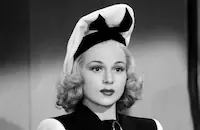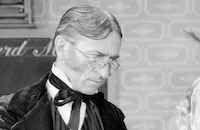Earthworm Tractors

Brief Synopsis
Cast & Crew
Raymond Enright
Joe E. Brown
June Travis
Guy Kibbee
Dick Foran
Carol Hughes
Film Details
Technical Specs

Synopsis
When Mississippi salesman Alexander Botts learns that his fiancée, Sally Blair, will not marry him unless he sells a big, important product, he dashes off a letter to the Earthworm Tractor Company. Impressed by his initiative, H. J. Russell, the company head, hires Alexander, hoping that he will be able to close a big sale with a difficult client. On his way to demonstrate the tractor to prospective customer Mr. Jackson, Alexander stops to help Mabel Johnson, whose car is stuck in the mud. While attempting to free her car, Alexander destroys a bank window and a taxi. Mabel suggests that he sell her father Sam a tractor, but adds that he has thrown out all previous tractor salesmen. Mistaking the name Johnson for his actual prospect Jackson, Alexander persuades Johnson to take a ride on his tractor. As he knows nothing about tractors, Alexander loses control of the machine and cuts a path of destruction through the swamp. Luckily, Jackson has been watching and is so impressed that he orders several tractors. Upon learning that the Johnsons are having their house moved, Alexander decides to surprise them by moving it himself with the tractor. Unfortunately, the Johnsons are having dinner at the time and believe that they are experiencing an earthquake. Discouraged, Alexander finds that Sally has married his rival, Emmet McManus. Delighted by this turn of events, Alexander goes back for Mabel, who, believing that he loves someone else, has run away to Chicago. Alexander goes to Chicago and, after calling every Johnson in the telephone book, finds Mabel working the switchboard in his hotel. He follows her back to Mississippi and takes her father on another wild tractor ride. Johnson is furious until he realizes that a dynamite explosion nearby has improved his hearing. He orders his tractors from Alexander, whose career is thus assured.

Director
Raymond Enright
Cast

Joe E. Brown

June Travis

Guy Kibbee

Dick Foran

Carol Hughes

Gene Lockhart

Olin Howland

Joseph Crehan
Rosalind Marquis
Charles Wilson

William Davidson

Irving Bacon
Stuart Holmes
Sarah Edwards
Russ Powell
Henry Hall
Harry Depp
Cliff Saum
Jerry Fletcher
Milton Kibbee
Jack Richardson
Sam Flint
Victoria Vinton
Henry Otho
Phil Ryley
Evelyn Burwill
Harvey Perry
Crew
Sam Bischoff
Hugh Cummings
Leo F. Forbstein
Chuck Geisler
Doug. Gould
Esdras Hartley
Lee Katz
H. F. Koenekamp
Richard Macauley
Peter Milne
Paul Smith
Paul Gerard Smith
Arthur Todd
Joe Traub
Jack L. Warner

Film Details
Technical Specs

Articles
Earthworm Tractors - Earthworm tractors
By Frank Miller

Earthworm Tractors - Earthworm tractors
Quotes
Trivia
Notes
The pre-release title was Three in Eden. Film Daily notes that Dick Foran replaced Dick Purcell because Purcell was still working on Murder in the Big House. According to Motion Picture Herald, some of the scenes invented by the screenwriters were based on the actual moving of a movie star's mansion and incidents connected with rebuilding Warner Bros. studios. The Peoria Star notes that author William Hazlet Upson was a former service man at the Caterpillar Tractor Company. Scenes were shot on location in East Peoria, IL at the Caterpiller plant. They were used for background and the action, filmed in Hollywood, was superimposed. Technical advisor Paul Smith worked at the Caterpillar Co. A news item in Hollywood Reporter notes that The Holt Co., manufacturers of Caterpillar tractors, spent $250,000 for ads and brochures, featuring Joe E. Brown and their tractors, in conjunction with the release of the film.















